Randy Alcorn's Blog, page 107
January 23, 2019
An Introduction to god, with a Lowercase g

This is an excerpt from Greg Gilbert’s book What Is the Gospel? It’s also cited by Ray Ortlund in his book called The Gospel: How the Church Portrays the Beauty of Christ. I highly recommend both books.
Gilbert uses satire to portray the type of god that many people seem to believe in these days. He’s basically toothless and harmless, so diminished in His attributes that He is neither to be feared nor to be loved on any deep level.
He perhaps merits only our mild affection, not our fear, reverence, respect, submission or obedience. Whatever else we might say about this god, He is certainly not the true God revealed in the Bible. No wonder Satan loves for people to believe this caricature of the Almighty:
Let me introduce you to god. (Note the lowercase g.)
You might want to lower your voice a little before we go in. He might be sleeping now. He’s old, you know, and doesn’t much understand or like this “newfangled” modern world. His golden days—the ones he talks about when you really get him going—were a long time ago, before most of us were even born. That was back when people cared what he thought about things, and considered him pretty important to their lives.
Of course all that’s changed now, though, and god—poor fellow—just never adjusted very well. Life’s moved on and passed him by. Now, he spends most of his time just hanging in the garden out back. I go there sometimes to see him, and there we tarry, walking and talking softly and tenderly among the roses…
Anyway, a lot of people still like him, it seems—or at least he manages to keep his poll numbers pretty high. And you’d be surprised how many people even drop by to visit and ask for things every once in a while. But of course that’s alright with him. He’s here to help.
Thank goodness, all the crankiness you read about sometimes in his old books—you know, having the earth swallow people up, raining fire down on cities, that sort of thing—all that seems to have faded in his old age. Now he’s just a good-natured, low-maintenance friend who’s really easy to talk to—especially since he almost never talks back, and when he does, it’s usually to tell me through some slightly weird “sign” that what I want to do regardless is alright by him. That really is the best kind of friend, isn’t it?
You know the best thing about him, though? He doesn’t judge me. Ever, for anything. Oh sure, I know that deep down he wishes I’d be better—more loving, less selfish, and all that—but he’s realistic. He knows I’m human and nobody’s perfect. And I’m totally sure he’s fine with that. Besides, forgiving people is his job. It’s what he does. After all, he’s love, right? And I like to think of love as “never judging, only forgiving.” That’s the god I know. And I wouldn’t have him any other way…
Okay, we can go in now. And don’t worry, we don’t have to stay long. Really. He’s grateful for any time he can get.
Photo by Peter Mason on Unsplash
January 21, 2019
The Good We Never Ask For: What God Does for Us in Suffering
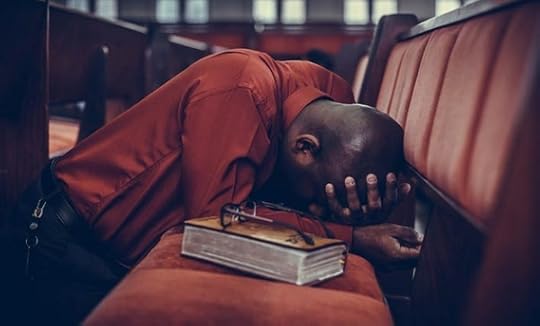
Christian slaves in America sometimes were forbidden to sing—even to God. So when they went to the river, they would hang wet blankets around themselves, then sing into pots filled with water to absorb the sound. “Sorrowful, yet always rejoicing” (2 Corinthians 6:10), they couldn’t hold inside their songs of praise.
Perhaps what you’re facing makes you wonder if God has turned His back on you. Your trial may last a day, a year, a decade, or more. But I doubt your circumstances are worse than that of those Christian slaves, stripped of liberty and dignity, with families routinely torn apart. Yet they couldn’t force themselves not to sing.
Throughout the centuries and around the world, many suffering believers affirm that God uses hard times to draw us to Him, to give us a profound happiness in Him, and to build greater Christlikeness and dependence. We pray “bring me closer to you, Lord,” and usually in answer, our loving and sovereign God keeps trials coming our way—even sometimes when we beg Him not to.
There’s no nearness to God without dependence on God. And nothing makes us more dependent on Him than when the bottom drops out.
Inevitable and Purposeful
We Christians will be delivered from eternal misery. But God never says we’ll avoid hardships now. In fact, He specifically promises them, in verses we seldom post on the refrigerator. “Beloved, do not be surprised at the fiery trial when it comes upon you to test you, as though something strange were happening to you” (1 Peter 4:12). I smile when I read this. It’s like God is saying, “Whatever gave you the idea you wouldn’t suffer?”
The apostle Paul told believers he was sending Timothy to them “to establish and exhort you in your faith, that no one be moved by these afflictions. For you yourselves know that we are destined for this” (1 Thessalonians 3:2–3). If we don’t know this, we should! When we think of what God has destined us for, abundant life and resurrection come to mind, but trials rarely do. Yet God assures us that He Himself not the curse or Satan—has actually destined us to suffer. Afflictions are not just inevitable; they’re purposeful. Though they may appear random, they are the product of God’s intelligent and loving design.
In Trusting God, Jerry Bridges wrote, “That which should distinguish the suffering of believers from unbelievers is the confidence that our suffering is under the control of an all-powerful and all-loving God. Our suffering has meaning and purpose in God’s eternal plan.”
Good Comes Through Adversity
What can suffering do for me? It can show me the impossibility of finding true happiness outside of God. When what I once leaned on for happiness—my health, career, wealth, or popularity—crumbles into dust, the way is cleared for me to see that God is my only solid foundation.
We’re right to ask God for relief. Nevertheless, every time we ask Him to remove difficulty, we may be asking Him to forgo an opportunity to declare His greatness or deepen our relationship with Him. When did you last hear someone say, “I grew closest to God when my life was free from suffering”?
Ten months after his son was killed in a car accident, Greg Laurie told me, “What I wish is that I could have learned and grown and drawn close to the Lord just like I have, but that Christopher was still here.” Greg captured it perfectly—I too wish I could have all the good God brings through adversity without all that pain. But it doesn’t work that way, does it?
What None of Us Wanted
My beloved wife, Nanci, was diagnosed with colon cancer almost exactly one year ago. Throughout 2018 she underwent a long series of difficult treatments. We experienced countless appointments and changed diagnoses and timelines and side-effects. We saw long-term planning become guesswork.
As Nanci and I walked this path together over the last year, we resolved to worship our sovereign God, who bears the scars of His love for us. We’ve read His word and discussed great books about His attributes. We’ve senses His presence and seen Him increase our dependence on Him. We’ve been deeply touched as our family and friends rallied around us. It’s been my privilege to serve Nanci more than ever, especially after all the ways she has served me over the years.
God graciously brings all this good out of what? Out of what none of us wanted to happen. (We’re grateful that recent tests showed no sign of cancer, and are continuing to ask God to renew her strength and return her to full health.)
Our Father sometimes answers our prayers to relieve our suffering, and each time He does we thank Him wholeheartedly. But when He answers no, we must honor His desire to work in us more deeply.
If asked, “Do you want to be closer to Jesus, and more like him?” we all know what we should say. Yet, if God answered all our prayers for relief from suffering, He would be delivering us from the very thing we say we want. Christlikeness is something to long for, not be delivered from. It’s not easy to pray, “Please do whatever it takes to make me more like Jesus.” But when He does whatever it takes, we should trust Him.
Welcome What the Good Trials Bring
Since suffering builds character, no wonder the Bible tells us, “Count it all joy, my brothers, when you meet trials of various kinds, for you know that the testing of your faith produces steadfastness” (James 1:2–3). How can we possibly welcome difficulties instead of resenting them? By trusting God when He tells us trials draw us closer to Him, mature us, expand our ministry, and prepare us for eternal joy.
God doesn’t command us to cheer because we’ve been betrayed, diagnosed with cancer, or lost a loved one. Rather, our joy comes in the expectation of adversity’s by-products, including the development of godly character, greater dependence on Jesus, and countless reasons hidden to us for now (but crystal clear in our Father’s mind).
Paul said, “Not only that, but we rejoice in our sufferings, knowing that suffering produces endurance” (Romans 5:3). Paul and James both claim we should rejoice in suffering because of the fruit it ultimately yields. When we see with an eternal perspective, we can say, “This trial is difficult, but God is sovereign, loving, and kind. Through His grace and empowerment, I will become more like Jesus and closer to Him. And I will be eternally grateful for what God did through these hard times.”
Enter the Joy of Your Master
Someday, we’ll see with clear-eyed certainty that God’s word was right all along, that “the sufferings of this present time are not worth comparing with the glory that is to be revealed to us,” and that “for those who love God all things work together for good” (Romans 8:18, 28).
Someday, we’ll appreciate the value of each minute of every purpose-filled trial. But let’s not wait until we die to believe what God says about our present suffering. By faith, for His glory and our good, let’s front-load God’s promises into our hearts and minds today, and get a head start on entering into our Master’s happiness.
Browse more resources on the topic of suffering, and see Randy’s related books, including If God Is Good.
Photo by Samuel Martins on Unsplash
January 18, 2019
The Man Who Shared Jesus with Chuck Colson—and Changed Eternity for Him and Countless Others
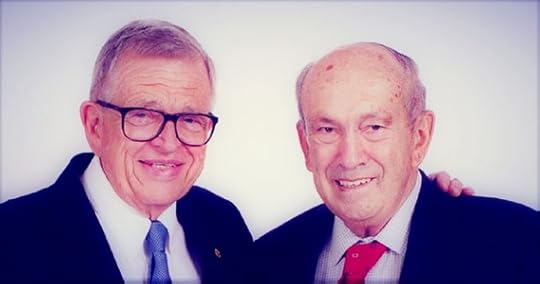
Earlier this month, Tom Phillips, who led Chuck Colson to Jesus in 1973, went to be with his Lord and Savior. When asked in an interview if he had ever gotten over the night when Christ gripped his life, Chuck replied, “No, and I never want to get over it. When I think about who I was that night and who I had been, and then think about what Jesus has meant to me since and knowing that I can live my life without suffocating in my own sin—which I would have otherwise—I am so filled with gratitude that I am compelled to do what Jesus commands. That is why I keep doing what I am doing. I am so grateful for what He has done for me.”
Because of the heart God gave him for prisoners, Chuck founded Prison Fellowship in 1976. He ministered in more than 800 prisons, in 40 countries around the world, over the next 35 years. (EPM has had the privilege of supporting their ministry for many years.)
As I’ve shared before, I loved Chuck and thought the world of him. In every face-to-face and written contact I had with him, I was touched by his heartfelt sincerity and his love for our Savior. So I thank God for Tom Phillips having that role in the life of someone I deeply loved and admired—and who I really look forward to seeing again.
The following article by Emily Colson, Chuck’s daughter, shares about how Tom’s quiet faithfulness impacted her dad’s life, and how that in turn changed her life and the lives of countless others:
The Man Who Led My Dad to Christ: Tom Phillips (1924-2019)
By Emily Colson and David Carlson
January 10, 2019
Tom Phillips led my Dad, Chuck Colson, to the Lord in 1973. And yesterday, Tom went to be with Jesus.
Those of you who know about Tom Phillips probably know him from that incredible scene in my Dad’s first book, Born Again. It happened in the midst of the Watergate crisis. While on vacation in New England, my dad sought out Tom, his friend and associate. There was something different about Tom, a peace my dad desperately needed. They sat together on Tom’s screen porch, and Tom, in his humble, persistent way, asked Dad how he was doing. As my dad began to pour out his heart to Tom, Tom shared how he—a successful businessman who seemed to have everything—realized he had nothing without Jesus Christ. Tom shared with my dad his story of attending a Billy Graham crusade, and giving his life to Christ.
And then Tom read from C. S. Lewis’s Mere Christianity about the great sin of pride. My dad was cut to the heart. Tom offered to pray with my dad, but he declined. Dad thanked Tom for the evening, and headed to his car parked in Tom’s driveway. Here is that passage from “Born Again”:
“Outside in the darkness, the iron grip I’d kept on my emotions began to relax. Tears welled up in my eyes as I groped in the darkness for the right key to start my car. Angrily I brushed them away and started the engine. ‘What kind of weakness is this?’ I said to nobody . . .
“As I drove out of Tom’s driveway, the tears were flowing uncontrollably . . . I pulled to the side off the road not more than a hundred yards from the entrance to Tom’s driveway . . .
“With my face cupped in my hands . . . I forgot about machismo, about pretenses, about fears of being weak. And as I did, I began to experience a wonderful feeling of being released . . .
“And then I prayed my first real prayer, ‘God, I don’t know how to find You, but I’m going to try! I’m not much the way I am now, but somehow I want to give myself to You.’ I didn’t know how to say more, so I repeated over and over the words: Take me.”
When I heard the news that Tom had died, I had to catch my breath. But almost immediately a smile came to my face as I thought about his reunion with Dad in the presence of our Savior. And about the hundreds of thousands of men and women who came to know Jesus because Tom shared his faith with my Dad.
This past summer I felt a sense of urgency to talk with Tom. I knew he was 94, and there was something I needed to say to him. I called and left a message, hoping he would be up for a visit. Several weeks went by with no response. And then sure enough, Tom called to tell me he would be thrilled to see me, and invited me to his home.
The night before my visit, I re-read the chapter in Born Again about my dad’s visit that fateful night. As I pulled up to Tom’s home, which is just around the corner from the very house where my Dad talked with him some 45 years ago, my emotions were raw. A nurse came out to greet me, and waved me into the kitchen door. “Tom has been so excited about your visit,” she said. “He wanted to be sure this lunch was special.”
Tom was just as gracious and gentle as I had remembered, welcoming me into his home. We sat around his kitchen table, enjoying food and conversation. And then I pulled out a manila envelope. “Tom, I brought you a gift,” I said as I fought back tears. “This is nothing, and this is everything.” I could barely speak past the lump in my throat. “Tom, I want to thank you,” I began. “You were obedient to Christ and shared your faith with my dad. And because of that, thousands of lives were changed. But, Tom, this is personal. My life was changed too.”
My tears were now uncontrollable. One of the caregivers brought me a box of tissues. “When my dad gave his life to Christ, it gave me my dad back…maybe for the first time.” I stumbled over my words, trying to convey how my relationship with my dad radically changed. “And then, Tom, I gave my life to Christ. And then…” I paused, and opened the manila envelope to hand him a photograph of my father baptizing my son Max. “…And then, my son gave his life to Christ.” Tom smiled at the photo. Across the top of the photograph I had written “Thank you Tom”, and along the bottom, my son, in his beautiful looping handwriting had written, “Love Max.”
Afterward Tom invited me into his mahogany paneled study. The walls were covered with books on business and history and Christianity. An entire shelf was devoted to books my dad had written. There beside that shelf was Tom’s copy of Mere Christianity. Tom pointed to his large-type Bible on his desk and smiled, “It’s still the best book I’ve ever read.”
I told Tom how my Dad used to say that Tom had never witnessed to anyone before he witnessed to my Dad. I asked him if that were so—had he shared the Gospel with others before? Being the quiet, humble man he was, Tom just shrugged and said, “a little.”
And then Tom told me something that amazed me. Tom had told no one about Dad’s visit that evening. It wasn’t until Born Again was published that people knew. But that was Tom. He didn’t want credit. The credit belonged to God alone. And he was more than content with that.
We said our goodbyes and I headed for the car. Something struck me as I drove off: the remarkable peace about Tom. Here he was, 94, obviously in frail health; his beloved wife, Gert had passed a year before, and yet he exuded peace. It was the same peace that drew my dad to Tom. It was the peace of Christ.
Before I headed back home, I drove around the corner to Tom’s old house and parked my car in the street. I just needed to be there. This was the very driveway where my dad, some 45 years ago, through tears, had surrendered to Christ.
Tom has entered into the presence of The Lord. And he has certainly heard, “Well done, my good and faithful servant.”
Emily Colson is a member of the Board of Directors of the Colson Center for Christian Worldview and author of the book “Dancing with Max”
Copyright 2019 by the Colson Center for Christian Worldview. Reprinted from BreakPoint.org with permission.
Like Tom and Chuck are experiencing now in Christ’s presence, one day we too will see how our acts of faithfulness and obedience changed the lives of others. Perhaps we’ll see how we helped people become interested in following Christ. (Fortunately, we still have time to make a difference in people’s lives, a difference that they—and we—will be grateful for later!)
January 16, 2019
Jackie Hill Perry Shares a Powerful Prolife Story

I’ve written before about my appreciation for Jackie Hill Perry’s book Gay Girl, Good God: The Story of Who I Was, and Who God Has Always Been. In this excerpt from the book, she shares a powerful prolife story. —Randy Alcorn
“I want an abortion,” my mother said. On the other end of the phone was her best friend. They’d known each other since they were four. When Dwight D. Eisenhower was president and when many women had babies they didn’t want or couldn’t afford to keep but with no money to stop them from coming, they let ’em grow anyhow. The thick white extension cord sticking out from the bottom of the phone kept getting caught between her wrist and her forearm. She moved the phone to the other ear to let it unravel. It was adding to the frustration she felt burning in her hands. “I don’t want the baby in this way.”
What she meant was, she didn’t want a baby with him. The coworker turned friend that became a lover. He was the “way” she never intended to bring another baby into the world by. Her first child, my brother, was already sixteen. She had him with a man she loved, and who loved her back. Her and my brother’s father actually went on dates, made plans to spend time together, and called each other names like “Baby” and “Sweetie.”
 My father was a twenty-five-year-old man, with a beautiful face but who had no idea how to sit still and love anything that would make him consistent. Their relationship was too complicated to bring a child into, she thought, so why not remove it or should I say, me.
My father was a twenty-five-year-old man, with a beautiful face but who had no idea how to sit still and love anything that would make him consistent. Their relationship was too complicated to bring a child into, she thought, so why not remove it or should I say, me.
Her best friend listened. She could hear the irrationality in my mother’s argument. It being that abortion was to be considered instead of life. That removing me from the earth would make her own world better. Society had changed a whole lot since then but God was still the same. Abortion was still evil and had always been, even before the day “Thou shalt not kill” thundered out of God’s mouth. She wasn’t thinking clearly and her best friend had to help her see it for herself. She opened her mouth, and God spoke, “How do you know that God didn’t intend for you to have the baby in this way?”
Like a cold glass of water to the face, my mother’s eye widened, her heart beat truth into her chest, and the noise of death quieted down for a second. She had never considered providence and how involved it was with her womb. God, all-knowing, maker of man, creator of life, had orchestrated my conception. Though accomplished in sinful lusts, He had given me to her. He was forming me in her womb. Unbeknownst to her, He had chosen me before the foundation of the world to know Him. And no one—not my mother, my father, or even me—would get in His way.
Along with artists Sho Baraka and Propaganda, Jackie was part of a prolife video, “73–17: Life's Blueprint Unfolds in the Womb,” released last year by Desiring God and Humble Beast. And she also wrote an article addressed “To a Woman Considering Abortion.”
For more on abortion and the sanctity of life, see Randy’s books Why ProLife? and ProLife Answers to ProChoice Arguments.
January 14, 2019
How God Changes Our “Why Me?” Questions in Suffering to “Why Not Me?”

There was a time when I could not fully accept any explanation for evil and suffering that didn’t make sense to me, start to finish. However, over the years, and through the process of writing my book If God Is Good, I’ve come to trust my own understanding less, and God’s Word more.
I find a strange delight in being swallowed up by the immensity of God’s greatness and by the divine mysteries that once disturbed me. Knowing that I’ll sit before God’s judgment seat—not He before mine—I choose to trust Him. And the more I do, the more sense the story makes to me.
And I am certain about this: the best answer to the problem of evil is a person—Jesus Christ. I’m convinced He is the only answer. The drama of evil and suffering in Christ’s sacrifice addresses the very heart of the problem of evil and suffering. And one day it will prove to have been the final answer.
So whenever you feel tempted in your suffering to ask God, “Why are you doing this to me?” look at the Cross and ask, “Why did you do that for me?”
In this excerpt from his 2018 book God’s Grace in Your Suffering, David Powlison writes about how God changes our “Why me?” questions in suffering. (My thanks to Justin Taylor for sharing this on his excellent blog.)
So often the initial reaction to painful suffering is
Why me?
Why this?
Why now?
Why?
You’ve now heard God speaking with you. The real God says all these wonderful things, and does everything he says.
He comes for you, in the flesh, in Christ, into suffering, on your behalf.
He does not offer advice and perspective from afar; he steps into your significant suffering.
He will see you through, and work with you the whole way.
He will carry you even in extremis.
This reality changes the questions that rise up from your heart. That inward-turning Why me? quiets down, lifts its eyes, and begins to look around.
You turn outward and a new and wonderful question forms.
Why you?
Why you, Lord of life?
Why would you enter this world of evils?
Why would you go through loss, weakness, hardship, sorrow, and death?
Why would you do this for me, of all people?
But you did.
You did this for the joy set before you.
You did this for love.
You did this showing the glory of God in the face of Jesus Christ.
As that deeper question sinks home, you become joyously sane. The universe is no longer supremely about you. Yet you are not irrelevant. God’s story makes you just the right size. Everything counts, but the scale changes to something that makes much more sense. You face hard things. But you have already received something better which can never be taken away. And that better something will continue to work out the whole journey long.
The question generates a heartfelt response.
Bless the Lord, O my soul, and do not forget any of the good things he does, who pardons all your iniquities and heals all your diseases, who redeems your life from the pit, who crowns you with lovingkindness and compassions, who satisfies you with good things as your adornment, so that your youth is renewed like the eagle. Thank you, my Father.
You are able to give true voice to a Thank you amid all that is truly wrong, because all sins and all sufferings have now come under his lovingkindness.
Finally, you are prepared to pose—and to mean—an almost unimaginable question.
Why not me?
Why not this?
Why not now?
If in some way, your faith might serve as a three-watt night light in a very dark world, Why not me?
If your suffering shows forth the Savior of the world, Why not me?
If you have the privilege of filling up the sufferings of Christ?
If he sanctifies to you your deepest distress?
If you fear no evil?
If he bears you in his arms?
If your weakness demonstrates the power of God to save us from all that is wrong?
If your honest struggle shows other strugglers how to land on their feet?
If your life becomes a source of hope for others?
Why not me?
Of course, you don’t want to suffer, but you’ve become willing: “If it is possible, let this cup pass from me; yet not as I will, but as you will.”
Like him, your loud cries and tears will in fact be heard by the one who saves from death.
Like him, you will learn obedience through what you suffer.
Like him, you will sympathize with the weaknesses of others.
Like him, you will deal gently with the ignorant and wayward.
Like him, you will display faith to a faithless world, hope to a hopeless world, love to a loveless world, life to a dying world.
If all that God promises only comes true, then Why not me?
—David Powlison, God’s Grace in Your Suffering (Wheaton: Crossway, 2018), 115–17.
Postscript: In October, David was diagnosed with pancreatic cancer. Nanci and I were touched by David’s video this past fall sharing about his initial diagnosis (now determined after surgery to be stage four cancer), especially since we were journeying through her own cancer treatments. David says this experience has given him the opportunity to live the things he’s written about and says he believes. Here’s that first video, which includes much encouraging Scripture.
You can read and watch further updates on his health on the CCEF site.
Photo by Andrew Seaman on Unsplash
January 11, 2019
NFL Weekend Playoffs Include a Number of Christ-followers
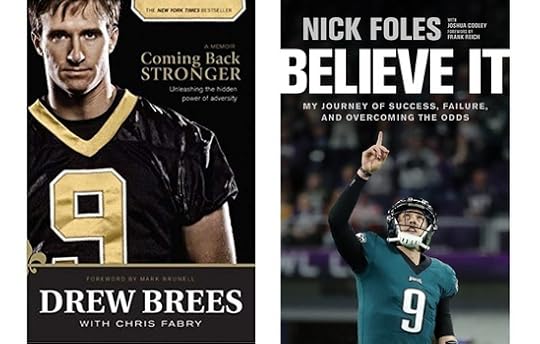
Before anything else, let me highly recommend pastors and churches consider using the resources of Football Sunday in their churches the day of the Super Bowl, which is the single largest secular event people gather together for each year.
Even prior to last year’s event, the biggest yet, over 20,000 people had come to Christ through the clear gospel presentation and the testimonies of players. You can use the full video, or any parts of it you choose in church. It also makes a great half-time alternative where you hear players talk about their faith in Christ. It’s not preachy, but it’s powerful. Watch last year’s 2018 Football Sunday event, hosted by commentator James Brown, to get a feel for what it’s like.
There are easily more than fifty faithful believers among the players and coaches on the remaining eight playoff teams this weekend. If you’re not a football fan you probably don’t care, but this serves as a reminder that God has His people everywhere. He may not care that much about the game outcomes, but He certainly cares a great deal about His children, and as much for those on the losing side as the winning one.
I am most closely connected to the Philadelphia Eagles vs. New Orleans Saints game, because I know a number of players on both teams who are faithful believers. In fact I’ve exchanged messages with several on both teams this week.
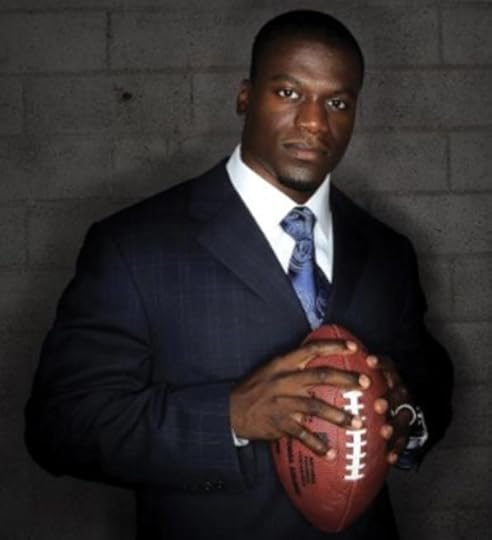 Because of his open testimony for Christ and his defense of racial justice and the unborn, I have from time to time written about Ben Watson, tight end for the New Orleans Saints. This season when New Orleans QB Drew Brees, also a Christ-follower and the author of Coming Back Stronger, had another milestone in an incredible career, he said this: “One of the greatest things about the 500th touchdown pass, it was caught by one of my favorite teammates of all time. I couldn’t think of a better guy to catch this touchdown than Ben Watson. He is a terrific veteran, and I look up to him.”
Because of his open testimony for Christ and his defense of racial justice and the unborn, I have from time to time written about Ben Watson, tight end for the New Orleans Saints. This season when New Orleans QB Drew Brees, also a Christ-follower and the author of Coming Back Stronger, had another milestone in an incredible career, he said this: “One of the greatest things about the 500th touchdown pass, it was caught by one of my favorite teammates of all time. I couldn’t think of a better guy to catch this touchdown than Ben Watson. He is a terrific veteran, and I look up to him.”
After scoring a touchdown in a game, Ben, in the end zone, creatively announced that he and his wife Kirsten are expecting twins, their sixth and seventh children (watch the video here).

Check out this delightful feature of Ben and his wife and children, done by NFL Films after Ben announced recently he is retiring at the end of this season. (It also shows one of the most spectacular plays in NFL history, where tight end Ben Watson, then playing for the Patriots, runs down a fast Denver cornerback at the one yard line to prevent what should have been a 101 interception touchdown).
I have highly recommended Ben’s book Under Our Skin. Ben has also written The New Dad’s Playbook, and is a powerful prolife advocate. Here he is speaking at the 2017 March for Life in Washington DC.
 I’ve also written before about Nick Foles. Nick is a good friend who I deeply appreciate. The most important thing about him is not that he holds five NFL records, but that he follows Jesus and loves his family. I shared about Nick’s book Believe It: My Journey of Success, Failure, and Overcoming the Odds when it was released in June. I highly recommend you read it. It doesn’t just tell another story of how great it is to win, though as MVP as last year’s Super Bowl Nick could have focused on that only. He didn’t. After winning the Super Bowl, at a press conference, Nick talked about failure and how important it is in forming our lives. In the book we see this fleshed out:
I’ve also written before about Nick Foles. Nick is a good friend who I deeply appreciate. The most important thing about him is not that he holds five NFL records, but that he follows Jesus and loves his family. I shared about Nick’s book Believe It: My Journey of Success, Failure, and Overcoming the Odds when it was released in June. I highly recommend you read it. It doesn’t just tell another story of how great it is to win, though as MVP as last year’s Super Bowl Nick could have focused on that only. He didn’t. After winning the Super Bowl, at a press conference, Nick talked about failure and how important it is in forming our lives. In the book we see this fleshed out:
The Indianapolis Colts are also in the playoffs. Their head coach is Frank Reich, who some believe should be declared coach of the year. I met Frank shortly after he retired from professional football, and was attending seminary. I was doing a book signing on the East Coast, where people would tell me their names and I would sign the book to them. This guy standing next in line said, “Frank Reich.” I looked up and said, “The Frank Reich who holds the all-time record for best comebacks in college football AND NFL history?”
He smiled and asked “You knew that?” We had a brief conversation. He went on to finish Reformed Theological Seminary, and eventually he became the RTS president. Then years later I heard he was an assistant coach in the NFL.
In November 2017 I saw Frank for the second time when he was the offensive coordinator of the Philadelphia Eagles. I was asked to speak to a team Bible study where Nick Foles introduced me. It was great to see Frank again. He told me he’s read my Heaven book, and he smiled pleasantly as I talked about Heaven to players, including all three Philly quarterbacks—each of them solid believers. (Frank wrote the foreword to Nick’s book.)

I loved this recent article about Frank’s background as an athlete and one of the most unlikely backgrounds for any NFL head coach: evangelical seminary president!
You don’t have to be in the playoffs to be God’s faithful servant. And the eight remaining teams, being only one fourth of the teams in the league, probably only have a fourth of the total number of believers.
 Case Keenum, quarterback of the Denver Broncos, is a great brother who I respect and appreciate. I also loved his book Playing for More: Trust Beyond What You Can See, which really touched me. I highly recommend it.
Case Keenum, quarterback of the Denver Broncos, is a great brother who I respect and appreciate. I also loved his book Playing for More: Trust Beyond What You Can See, which really touched me. I highly recommend it.
Finally, I’ll mention Kirk Cousins, quarterback of the Minnesota Vikings—another faithful and Christ-centered brother. A few months ago the Julie and Kirk Cousins Foundation began. I can’t think of a better way to wrap up this blog that to let Kirk and Julie Cousins (shown here with their son Cooper) share about their vision for the foundation, which is about investing in what matters and will outlast this life. More about their foundation and the worthy ministries they support is here.

January 9, 2019
Resting on God: A Puritan Prayer

Nanci and I love The Valley of Vision, which is a collection of brief and profound Puritan prayers compiled by Arthur Bennett (I love the leather edition linked to. It’s one of the few books worthy of having in leather!). We find them powerful and penetrating.
Here’s one I appreciated:
O God, most high, most glorious, the thought of Your infinite serenity cheers me, for I am toiling and moiling, troubled and distressed, but You are for ever at perfect peace. Your designs cause You no fear or care of unfulfilment, they stand fast as the eternal hills. Your power knows no bond, Your goodness no stint. You bring order out of confusion, and my defeats are Your victories: The Lord God omnipotent reigneth.
I come to You as a sinner with cares and sorrows, to leave every concern entirely to You, every sin calling for Christ's precious blood; revive deep spirituality in my heart; let me live near to the great Shepherd, hear His voice, know its tones, follow its calls. Keep me from deception by causing me to abide in the truth, from harm by helping me to walk in the power of the Spirit. Give me intenser faith in the eternal verities, burning into me by experience the things I know; Let me never be ashamed of the truth of the gospel, that I may bear its reproach, vindicate it, see Jesus as its essence, know in it the power of the Spirit.
Lord, help me, for I am often lukewarm and chill; unbelief mars my confidence, sin makes me forget You. Let the weeds that grow in my soul be cut at their roots; grant me to know that I truly live only when I live to You, that all else is trifling. Your presence alone can make me holy, devout, strong and happy. Abide in me, gracious God.
Photo by Austin Schmid on Unsplash
January 7, 2019
What Will It Mean for the Earth to Be “Full of the Knowledge of the LORD as the Sea Is Full of Water”?

A reader asked me, “The last part of Isaiah 11:9 says, ‘For the earth will be full of the knowledge of the LORD as the sea is full of water.’ Most of the things I’ve read focus on the first part of the verse, which says, ‘They will neither harm nor destroy on all my holy mountain.’ What are your thoughts on this beautiful promise in Isaiah 11:9 and how it relates to the New Earth?”
Here’s the context leading up to the culminating promise of a future time when the earth will be full of the knowledge of God:
6 The wolf will live with the lamb,
the leopard will lie down with the goat,
the calf and the lion and the yearling together;
and a little child will lead them.
7 The cow will feed with the bear,
their young will lie down together,
and the lion will eat straw like the ox.
8 The infant will play near the cobra’s den,
and the young child will put its hand into the viper’s nest.
9 They will neither harm nor destroy
on all my holy mountain,
for the earth will be filled with the knowledge of the Lord
as the waters cover the sea. (Isaiah 11:6-9)
A parallel passage to verse 9 is, “The earth will be filled with the knowledge of the glory of the LORD, as the waters cover the sea” (Habakkuk 2:14). Glory speaks of unparalleled magnificence. To know God fully is to be overwhelmed with the luminous greatness of who He is.
As the entire sea is water, Isaiah 11:9 speaks of a time and place where the pervasive “atmosphere” of the land of all the earth will be God and the knowledge of Him. The Hebrew erets is sometimes translated land and sometimes earth, as it is here in most translations, but the comparison of water and land in this verse is noticeable. The CSB captures this well and perhaps makes it clearer: “They will not harm or destroy each other on my entire holy mountain, for the land will be as full of the knowledge of the LORD as the sea is filled with water.”
In other words, there will be nowhere and no one devoid of the true and delightful knowledge of God, who is the source of all life, truth, and joy. There will be an authentic, personal, and universal knowledge of God. This is not mere knowledge about God, but a relational knowledge of Him and with Him. Just as when you are in the sea, water is all around you, so when you walk the face of the earth, God and the knowledge of Him will be all around you, all the time.
The words immediately preceding this are, “They will neither harm nor destroy on all my holy mountain.” So this is about a time on earth utterly devoid of harm and destruction, which is the inevitable result of universal knowledge of God in the last part of the verse. The earth will be untouched by sin and curse, and safely and eternally out of the reach of Hell.
That doesn’t fit with the millennium, which is followed by sinful people rebelling against God and then being destroyed by Him (Revelation 20:7-9). Isaiah 11:9 fits perfectly, however, with the New Earth, after the final judgment that follows the millennium, where “God will dwell with them” and “wipe every tear from their eyes,” “There will be no more death’ or mourning or crying or pain,” “nothing impure will ever enter it,” “the tree of life” will be planted as in Eden, there will be “no more curse,” “they will see his face,” and “the Lord God will give them light” (Revelation 21:3-4, 27; 22:2-4).
Here’s Isaiah 11:6-9 as paraphrased in the Message:
The wolf will romp with the lamb, the leopard sleep with the kid. Calf and lion will eat from the same trough, and a little child will tend them. Cow and bear will graze the same pasture, their calves and cubs grow up together, and the lion eat straw like the ox. The nursing child will crawl over rattlesnake dens, the toddler stick his hand down the hole of a serpent. Neither animal nor human will hurt or kill on my holy mountain. The whole earth will be brimming with knowing God-Alive, a living knowledge of God ocean-deep, ocean-wide.
This will be a totally transformed, restored, renewed, and redeemed Earth, and animals and human beings will be full of the true knowledge of the true God and therefore permeated by holiness and happiness. “We are looking forward to a New Earth, in which righteousness dwells” (2 Peter 3:13).
For more on the New Earth, see Randy’s book Heaven. You can also browse additional books and resources on Heaven available from EPM.
Photo by Sasha • Stories on Unsplash
January 4, 2019
Make Reading a Priority—and Let Books Change You—in the Coming Year

Ivan Mesa’s intro to The Gospel Coalition’s 2018 book awards is terrific, which is why I’m featuring it below. First, no, none of my books received an award, second this is a great list, and third, please click the link and look through the books and choose one or more and buy and actually READ them. Though I do read ebooks, I still believe that overall the brain connects better with the physical book you read, and carry and put in a coat pocket or brief case, and underline (yes, I know you can highlight ebooks, and I do).
PLEASE turn off the television and open a great book and begin to read. Tell yourself you will read a minimum of ten minutes before watching something or looking at a device. I guarantee you that if you do this every day, some days you will never turn on the TV. An hour or two will go by and you’ll realize how much better reading is than watching. I love good movies, though they’re hard to find. But nothing shapes you more than books. The problem is you don’t read passively, but actively, while watching is mostly passive. Let God feed you from His Word and great books—don’t let your television spoon-feed you.
“Let us move beyond the elementary teachings about Christ and be taken forward to maturity” (Hebrews 6:1). To do that, we need to READ! And to teach our children to read—girls certainly but boys all the more because their literacy rate tends to be lower than girls, and we need more mature thinking men to lead their homes and churches.
Here’s what Ivan wrote:
“Books are long enough to change you.”
I can’t determine who originally said this (and neither can the internet), but it’s something I firmly believe—and never more so than today.
In her recent book, Reader, Come Home: The Reading Brain in a Digital World (Harper, 2018), Tufts University professor MaryAnne Wolf examines how digital distractions are rewiring our brains, and we’re losing the ability to do deep, sustained reading. While much of her focus is on raising little ones in this new media landscape, she worries that
“[W]e, their guides, do not realize the insidious narrowing of our own thinking, the imperceptible shortening of our attention to complex issues, the unsuspected diminishing of our ability to write, read, or think past 140 [now 280] characters. We must all take stock of who we are as readers, writers, and thinkers.”
This is no less an issue for the books editor at The Gospel Coalition.
Sometimes the best wisdom I give TGC readers is to stop reading TGC—and all other digital voices demanding our attention now. TGC’s desire for our local and national events, as well as the books, curriculum, articles, podcasts, videos, and reviews we publish, is to resource(but never replace) the local church. Each year we review around 300 titles between our academic journal Themelios and our regular book reviews section, so we’re firmly committed to the written word as a means of supporting church leaders. And at the end of each year we take stock of the most helpful titles across various categories, using the following fourfold criteria:
offer gospel-centered argument and application;
include faithful and foundational use of Scripture, both Old Testament and New Testament;
foster spiritual discernment of contemporary trials and trends; and
encourage efforts to unite and renew the church.So here’s my advice this year: Buy one or more of these books (preferably in print); log out of social media; and recapture the joy of immersing yourself in a book.
As our attention spans decrease and we’re sucked into the social-media vortex with its trivialities and Outrage of the Day, one way we can quietly resist is by reading a book. Such a small act, when joined to an abiding walk with Jesus and a life of service in his church, makes a radical difference in our lives and those around us.
Also check out Tim Challies’s 2019 Reading Challenge.
Photo by Nicole Honeywill on Unsplash
January 2, 2019
John Stott’s Final Message
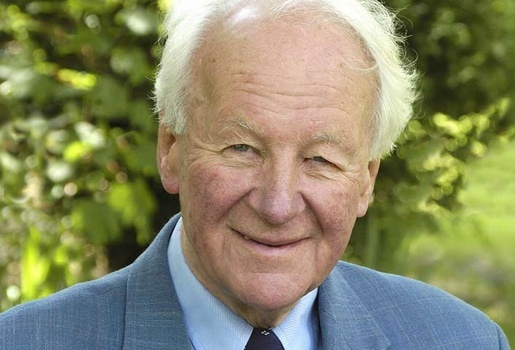
Like many others, I deeply loved British pastor-scholar John Stott (1921-2011) and appreciate his books and contribution to the church of Christ. He had a great impact on me as a young Christian.
Years ago, I met John Stott at a conference when my friend John Kohlenberger asked me to go with him to a private luncheon honoring Stott. John K. was invited, and at his request, I crashed the party. We were the only guys there not in coat and tie—neither of us was even close (especially me!). But John Stott, full of grace, shook our hands and spoke with us nonetheless, something we both treasured.
I loved reading John Stott’s final message, “The Model: Becoming More Like Christ,” which he preached in 2007 at the Keswick Convention. He was 86 years old, and clutched a cane as he slowly walked to the podium, accompanied by his research assistant. After the audience gave him a standing ovation, John thanked those who had introduced him, then stated with a smile, “But actually I thought I might be listening to my own obituary.”
What followed was “a clear and well-crafted journey through the evidence for this central purpose of God—to turn the world upside down by transforming His people into the image of His Son.” [1]
I hope you enjoy reading through this message:
The Model: Becoming More Like Christ
John Stott’s Final Address
I remember very vividly, some years ago, that the question which perplexed me as a younger Christian (and some of my friends as well) was this: what is God’s purpose for His people? Granted that we have been converted, granted that we have been saved and received new life in Jesus Christ, what comes next? Of course, we knew the famous statement of the Westminster Shorter Catechism: that man’s chief end is to glorify God and to enjoy Him forever: we knew that, and we believed it. We also toyed with some briefer statements, like one of only five words— love God, love your neighbor. But somehow neither of these, nor some others that we could mention, seemed wholly satisfactory. So I want to share with you where my mind has come to rest as I approach the end of my pilgrimage on earth, and it is—God wants His people to become like Christ. Christlikeness is the will of God for the people of God.
So if that is true, I am proposing the following: first to lay down the biblical basis for the call to Christlikeness; secondly, to give some New Testament examples of this; thirdly, to draw some practical conclusions. And it all relates to becoming like Christ.
For more on the character and attributes of Jesus Christ, and our call to follow Him, see Randy’s devotional Face to Face with Jesus: Seeing Him as He Really Is.



